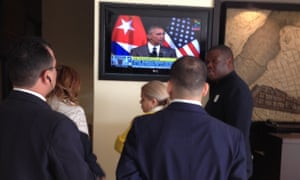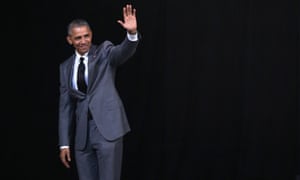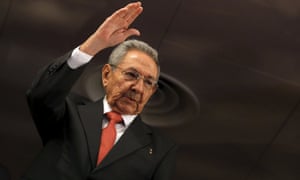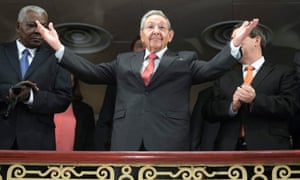Obama in Cuba: 'I have come to bury the last remnant of the cold war' – live

But not all Cubans are so critical of Barack Obama’s speech, my colleague Lisa O’Carroll reports from Havana. She watched the speech with staffers at the Parque Central Hotel.
“It was a beautiful speech, he said things I think: we have to forget the past and thing of the future,” said Sahely Monduy, one of the staff at the Parque Central hotel lucky enough to watch live feed of Obama’s speech.
“It will be difficult for Obama when he goes back because he has opponents who want the blockade to stay. But we hope,” she added.
“It’s good for the Cuban people to have a new relationship. It was a great speech,” said her colleague William Guerrero.
 Hotel staff. Photograph: Lisa O'Carroll
Hotel staff. Photograph: Lisa O'Carroll And the AP’s Andrea Rodriguez watched with a Mrs Delsi. “This man is brave,” Delsi said.
 — Andrea Rodríguez (@ARodriguezAP) March 22, 2016
— Andrea Rodríguez (@ARodriguezAP) March 22, 2016 Jonathan Watts
At least one prominent Cuban dissident has found Obama’s speech wanting: my colleague Jonathan Watts listened to the speech with Ailer Gonzalez, a pro-democracy activist and the wife of a dissident detained on Sunday in the middle of a peaceful protest.
We watched in a home full of plants, paintings and jazz posters. The television is a throwback to an earlier age. Reception was very grainy and the sound cut from time to time. Gonzalez’s views are fairly representative of the pro-democracy activists, if not the Cuban population at large.
She was decidedly worked up by this speech, but not in the way Obama would have like. She shook her head and groaned at the talk of salsa and Gloria Estefan.
“So weak! Bullshit! So far this speech is a gift to Raúl Castro. He will love this.”
The activist started hurling curses at the television. But the dissident household quieted when Obama talks of the need for rule of law, freedom of assembly, for democratic elections and for the right to protest without fear.
“That’s the only good part so far,” Ailer said. “But there’s a difference between saying, ‘I believe in this,’ and stating, ‘this [oppression of activists] is actually happening now in Cuba.’ Because it is.”
Obama’s talk of a “new era” drew only snorts of derision. “So we are in a new era with the same old dictator? That’s a total contradiction!”
As the audience applauded Obama’s speech, Ailer grew incandescent with rage. “That was a speech that will perpetuate the dictatorship. He didn’t challenge them. He didn’t mention the word ‘opposition’ even once.
“He told us to forget the past, to forget the horror and pain of exiles. He talked about what he believed but didn’t talk about what is happening. It was exactly what I expected from him. It was terrible.”
Obama: time to leave the past behind
Sometimes history starts small, Obama says in the conclusion of his speech.
|The tides of history can leave people in conflict and exile and poverty,” he goes on, “but the recognition of a common humanity. The reconciliation of a people bound by blood and the belief in one another – that’s where progress begins.”
He calls on the young people of to move their country forward – another subtle call for them to walk toward democracy. Then he makes one final nod to the past, saying the Americas’ histories “encompass revolution and conflict, struggle and sacrifice, retribution and now reconciliation.
“It is time now for us to leave the past behind. It is time for us to look forward together. Un futuro de esperanza” – a future of hope.
“My time here in Cuba renews my hope and my confidence in what the Cuban people can do. We will make this journey” together, he says.
He delivers the closing line of the speech in a quieter tone: “Si se puede” – yes we can. “Muchas gracias.”
 Barack Obama waves after delivering remarks. Photograph: Chip Somodevilla/Getty Images
Barack Obama waves after delivering remarks. Photograph: Chip Somodevilla/Getty Images Obama speaks of the Cuban exiles and their children in the United States: “I can tell you today that so many Cuban exiles carry a memory of painful and sometimes violent separation. They love Cuba. A part of them still considers this their true home. That’s why their passion is so strong, that’s why their heartache is so great.”
“This is not just about politics. This is about family,” he says.
Obama adds that “the home that was lost, the bond that was broken” – these are the trials of Cubans and Cuban Americans.
“People are people and Cubans are Cubans,” he says. “The reconciliation of the Cuban people,” between children of revolutions and exiles, he says, is central to Cuba’s future.
Obama hails 'new era' of the Americas
Obama then lists some of the joint projects the US and Cuba have already begin: brokering peace in Colombia’s 50-year guerrilla war, fighting Ebola in Africa, etc.
Then the president recalls first meeting Raúl Castro at the funeral of Nelson Mandela, and that they recognized the South African leader’s example.
“We’ve been a part of different blocs of nations in the hemisphere, and we will continue to have profound differences,” he says. But as we normalize our relations I believe we can foster a new sense of unity in the Americas.
“We are all Americans,” he says in Spanish. He urges American countries to relax their grip on ideologies and the disputes between them. “We are in a new era.”
Obama to Castro: do not fear free speech
“There’s already an evolution taking place inside of Cuba, a generational change. Many suggested that I come here and ask the people to tear something down,” Obama continues. He says he wants Cubans to lift something up.I’m appealing to the young people of Cuba, he goes on.
“The future of Cuba has to be in the hands of the Cuban people,” he says in Spanish.
Then he addresses Castro directly: he tells him“you need not fear” the voices of the Cuban people. He says he hopes Cuba will play a large part in the western world.
“My hope is that you can do so as a partner with the United States.”
 Cuban President Raul Castro waves as he arrives. Photograph: Carlos Barria/Reuters
Cuban President Raul Castro waves as he arrives. Photograph: Carlos Barria/Reuters “Now there’s no secret our governments disagree,” Obama goes on, again referring to “frank” conversations with Raúl Castro.
“Economic inequality, the death penalty, racial discrimination, wars abroad. That’s just a sample, he has a much longer list,” Obama jokes. “But here’s what the Cuban people need to understand,” he says, welcomes the disagreements.
“We do have too much money in American politics. But in America it’s still possible for sombeody like me,” he goes on, “to pursue and achieve the highest office in the land. That’s what’s possible in America.”
Because of those freedoms, because of those debates, he’s able to stand there as African American president of the United States, he says.
“There’s still enormous problems in our society. But democracy is the way we resolve them.”
He then talks about expanding healthcare, gay rights, fighting inequality, and the fact that there were two Cuban American Republicans running for president and a woman and a democratic socialist still in the 2016 presidential race.
“Who would have believed that back in 1959?” That’s a measure of our progress as a democracy.”
— Dan Roberts (@RobertsDan) March 22, 2016
There are fewer than couple of dozen people clapping in here now as Obama calls for free and open elections, and end to arbitrary detention.
“I believe that every person should be equal under the law. Every child deserves the dignity that comes with healthcare, and education,” Obama says.
“I believe citizens should be free to speak their mind without fear. To organize and to criticize their government, and to protest peacefully. And that the rule of law should not include arbitrary detentions of people who exercise those rights.”
“I believe that every person should have the freedom to exercise their faith peacefully and publicly.”
“And yes I believe … [in] free and democratic elections. Not everybody agrees with me on this.”
“But I believe those human rights are universal. I believe they are the rights of the American people, the Cuban people and people around the world.”
He then says that these reforms require “the free and open exchange of ideas” – a veiled call for freedom of speech.
“I know these issues are sensitive, especially coming from an American president. Before 1959, some Americans saw Cuba as something to exploit. Ignored poverty, enabled corruption.”
“Since 1959 we’ve been shadowboxers in these politics,” he says. “I know the history, but I refuse to be trapped by it”
“We will not impose our political or economic system on you. We recognize that every country, every people,” must choose their own model he says.
But he insists he needs to be honest with the Cuban people. As Marti said, “liberty is the right of every man to be honest,” Obama quotes the poet.
 Raul Castro gestures from a balcony after arriving to hear Barack Obama. Photograph: Michael Reynolds/EPA
Raul Castro gestures from a balcony after arriving to hear Barack Obama. Photograph: Michael Reynolds/EPA “Being self-employed is not about becoming more like America,” Obama says. “It’s about being yourself.”
He talks about some of the men and women he met yesterday at an entrepreneur event. “Hope begins,” he says, “with the ability to earn your own living.”
This is the logic in the financial and trade reforms, and encouragement of travel between the US and Cuba, Obama explains.
“As president of the United States I have called on our Congress to lift the embargo.”
The audience claps enthusiastically to that. Obama says it’s a burden on the Cuban people. “Even if we lifted the embargo tomorrow, Cubans would not realize their potential without continued change here in Cuba” – small applause for that.
“Two currencies shouldn’t separate the type of salaries Cubans can earn. The internet should be available across the island … There’s no limitation on the United States for Cuba to take these steps. It’s up to you.”
“I believe in the Cuban people,” Obama tells the crowd, in Spanish and English.
The US is normalizing relations with those people, he says. Cuban young people should believe in hope – not “blind optimism” or cynicism – he goes on.
“I’m hopeful because I believe that the Cuban people are as innovative as any people in the world,” he says. “In the United States we have a clear monument to what the Cuban people can build. It’s called Miami.”
Then he praises cuentapropistas and the ingenuity used to keep relic vehicles running. Cuba’s system of education is “an extraordinary resource”, he tells the crowd, to big applause.

— Dan Roberts (@RobertsDan) March 22, 2016
"Many people ask 'why now?'," says Obama. "One simple answer. What the US was doing was not working" pic.twitter.com/dprGk9P03O
Comments
Post a Comment